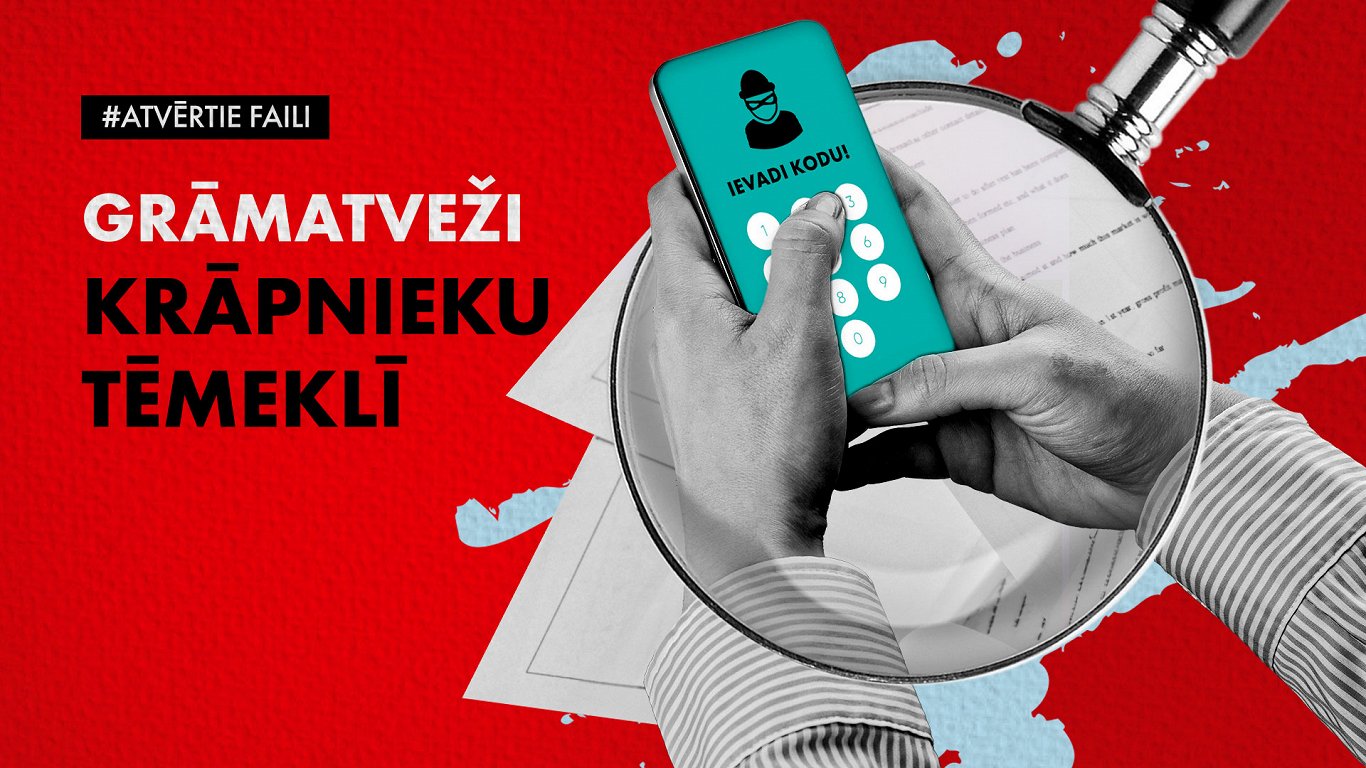According to Latvian Radio's investigation, fraudsters will typically pose as police or tax officials and demand quick action from a book-keeper, supposedly in order to avoid potentially huge losses to the company, or warning that someone was trying to obtain credit on the company's behalf.
Methods might involve repeatedly calling to pile on psycholgical pressure and even installing an app which will then give the crooks full access to the accountant's desktop – including saved passwords and banking details which can then be used to illegally transfer funds.
Between August 1 of last year and August 1 of this year, fraudsters stole about 2.33 million euros from companies in Latvia according to the data collected by the four largest banks in the country: Swedbank, SEB, Citadele and Luminor.
The Financial Intelligence Service (FID) also confirms that accountants tend to be the target of fraudsters' attacks. Accountants have access to the company's accounts and the authority to make payments, says Ieva Ģerģe, an expert of the Financial Intelligence Service.
"If in the past it seemed that accountants were the rare ones that fraudsters targeted, now it has really become a regular trend," she told Latvian Radio.
Fraudsters often sneak fake invoices into the company's e-mail, and the accountant pays them without realizing it.
She says that crooks often pretend to be senior managers at large companies and force the accountant to make urgent payments, as well as pretending to be a police officer or a bank employee and simulate a "secret operation" in which the accountant has to save the company's money.
"These are actually the most serious cases, because it is not the case that the accountant operates with only one company account. She can be the principal for several companies with hundreds of accounts. And then if these fraudsters get access to personal data, then it's no longer only about hundreds and thousands, those funds can be measured in millions," says Ģerģe.
Fraudsters work in professionally coordinated groups to carry out their schemes. In the group, each member has his own role and tasks. For example, an intermediary known as a "money mule" quickly moves the stolen money on.
"Basically, it's like a job for him. He opens an account or gives his data, which can be used, for example, by the organizers of criminal schemes, in exchange for some specific reward. The actions he performs: either you make a transfer, withdraw cash, or you transfer money to crypto-currency platforms. Your function is basically to legalize criminally obtained funds," says the FID representative.
Former Money Mule: I was hooked on a flat spot
Who are the people who work as "money mules" and how do they get involved in these schemes? Latvian Radio managed to contact 25-year-old 'Haralds' (not his real name), who three years ago helped fraudsters to legalize money.
He was looking for information on how to make money easily and quickly with cryptocurrency. On the social media platform Instagram, he noticed an ad offering to learn more about it on the communication site Telegram. There, a well-wisher addressed him in Russian.
Ater being passed along a chain of contacts the young man agreed to meet with a "consultant" in person at the Riga Central Station square. After a short discussion between the two, he was invited to continue the conversation in the car. To Harald's surprise, there were three other people there.
"I was scared, of course, but I'm alone, there are four of them, and I don't know them! Then I noticed that there were lots of tattoos on their hands, on their necks. I already thought a little that maybe they could be people who have already sat in prison."
They took his identity and banking details.
"They started telling me that they have some person abroad who has spent both the daily and monthly limit in his bank account, and that they only need me so that this person can transfer to my bank account that specific amount. And then pass it through all the applications they had registered me on."
Harald says that he tried to back out but the gang assured that everything would be fine. They said that four to eight thousand euros would be credited to Harald's account, and his profit on it would be 30%.
This amount seemed suspiciously large to him. Again he tried to back out of the deal.
"Then they rudely started telling me that I am this and that, that basically everything has already started and will be finished soon – well, all the applications that they had already made there, and that there is no way back for me, because I'm already registered there, there, there and there."
They threatened him with a knife and promised a physical showdown unless he cooperated. at that point "I just went along with whatever they told me and whatever they told me to do," he admits.
Haralds needed to legalize money through cryptocurrency applications. The raudsters would do all the actions, Haralds just needed to confirm them using his "Smart-ID" identity.
"After five minutes, I receive a notification from my internet bank that I received 8,000. A minute later, another 8,000 euros arrived. I was just shocked, I started to panic that 16,000 euros had already entered my account in six minutes. A minute or two later, again 8,000 euros came in. After that, 8,000 euros came into my account again, and it all happened in about ten or twelve minutes."
Haralds recalls that the money in his account came from companies in the United States. "I looked up those three companies on the Internet. One company was from a gun store, another company was from a hunting store, and the third was also related to hunting."
Criminals laundered money through cryptocurrency applications right there in the car overnight. In the morning, when Harald wanted to leave for work, the group reluctantly let him go. Before that, the men took a photo of both him and his passport.
"After that, I continued to confirm those codes for a while until it was eight in the morning, because at eight in the morning the banks started calling. And the first thing I did was call my bank right away. And right when I was still on the phone, the bank had already sent a letter with a bunch of questions about the money," Haralds recalls.
The bank blocked Haralds' account and suggested contacting the police. The young man lied to the criminals that the police had caught him and took away his phone. The scammers deleted all correspondence and seemed to have disappeared.
After about half a year, the criminals got in touch again with threats "Because they didn't manage to get all that money. Out of all that large amount, all they managed to realize was only 10,000, because 70,000 was frozen by the bank."
On the same day, the group arrived at the boy's house in the middle of the night and took him to the head of the gang.
"He told me that I would have to find people who would give me their bank accounts so that I could make money again with cryptocurrencies, take the money out, and then put that money in his hands."
Harald realized that he was at a dead end. He was looking for more money mules who were promised a profit of 300 euros for withdrawing money from an ATM.
In three months, Harald recruited seven people into the schemes. The mules had to immediately withdraw the money from the ATM and give it to Harald.
"Normally, banks react very quickly to such payments, and it had to be done as quickly as possible. When that account was given to that person, the reality was that the money could have been deposited in a minute, in five, in seven, in twenty minutes, and the person who gave his bank account had to stand at the ATM all the time and only withdraw money."
Haralds took the stolen money to the gang. He says the scheme involved Latvians, Estonians, and Lithuanians, and the money came from several countries.
The recruitment of money mules was stopped by the police who caught one of the money mules, who in turn reported that he had been recruited by Haralds. He says that only after he was arrested by the police did he fully understand what he was involved in.
"So it turns out that there was some kind of organized group behind me that just sits there and pretends to be from the bank and just calls people. And that's how they siphon off people's bank user codes, passwords and Smart-IDs as well. That's how all those sums of money came in."
Harald admitted his guilt in court. He was sentenced to a two-and-a-half-year suspended prison sentence, probationary supervision, the maximum permissible hours of community service, and the victims had to be compensated approximately 20,000 euros.
"I know that I will have to live with this for the rest of my life, because I really feel sorry for the people who were cheated of all these sums of money. I also tell my loved ones, relatives and acquaintances all about these things now because these things don't stop either. They will never stop because there are so many people who do these things and they haven't been caught yet," he says.
In 2022 and 2023, a total of 56 criminal cases were tried, in which 74 money mules were convicted, including 12 minors. The average age of a money mule was 23 years. People can face real prison sentences for these crimes, but the court often imposes community service on them.




























